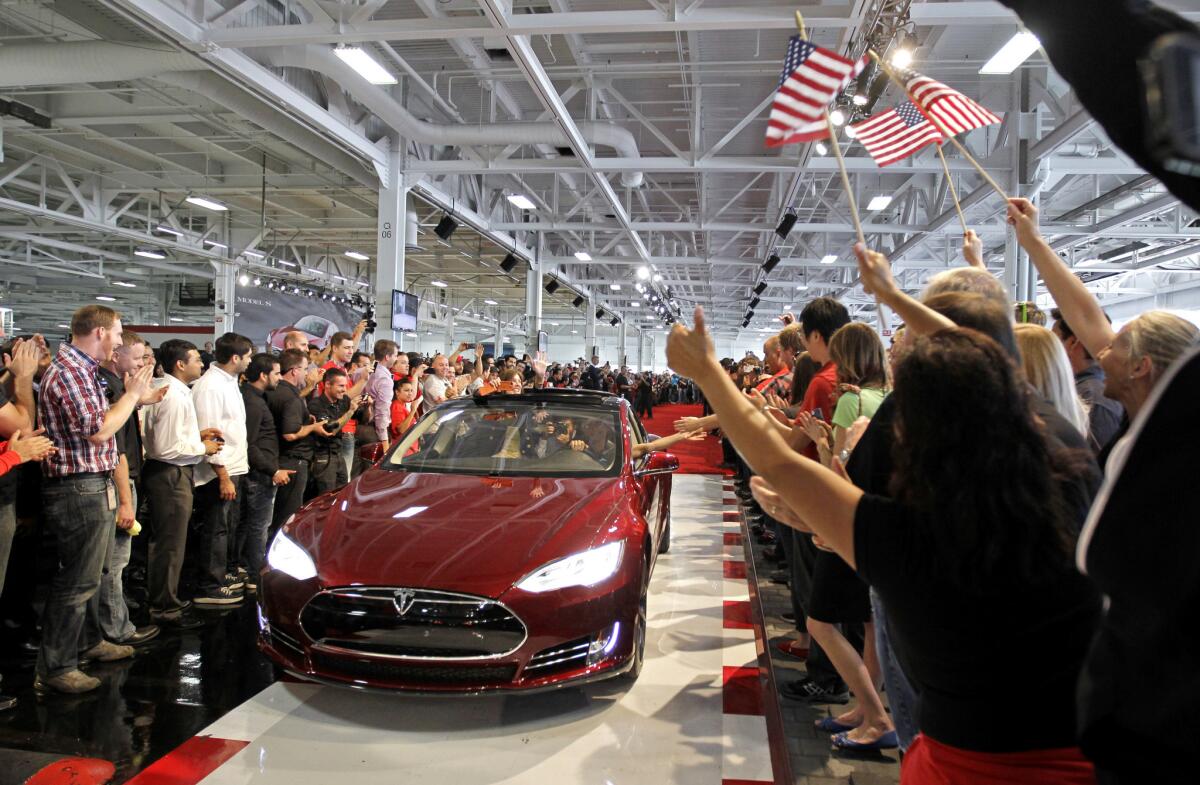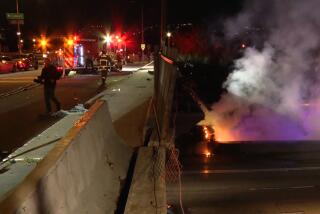Editorial: Tesla accident highlights the need to ensure worker visas aren’t abused

American immigration law allows employees of overseas firms to enter the country for a limited period of time to do business for their employers, including overseeing installation of machinery or other specialized products. The law does not allow those employees, who are here legally on what is called a B1/B2 visa, to do the installation work itself. But a work-site accident at a Tesla Motors auto plant in Fremont last year has spotlighted an uncomfortable reality: The B1/B2 visa system is subject to manipulation and fraud that perverts its intent and undercuts American businesses and workers.
The accident involved a Slovenian electrician named Gregor Lesnik, whose B1/B2 visa allowed him to enter the country in March 2015 on behalf of his Slovenia-based employer, ISM Vuzem, as a “supervisor of electrical and mechanical installation” at a paint shop in a South Carolina BMW plant. Instead, Vuzem allegedly redeployed Lesnik to the Tesla plant to install an industrial heating and cooling system, something his visa did not allow him to do. While walking on the roof in May 2015, Lesnik fell through, bounced off scaffolding and other internal structures and landed three stories below on the factory floor, breaking both legs and several ribs and suffering head injuries, including a concussion. Lesnik survived and sued his employers; the San Jose Mercury News recently used the case to explore the broader problems with the visa system.
Part of the problem is that even subcontractors exploit visa-holders, the workers usually still make more money in the U.S.
The State Department issues B1/B2 visas through consular offices overseas. They cover a broad range of potential uses, including traditional tourism, but are also given to employees entering for up to six months to do work for their foreign employer. The visas can be valid for as long as 10 years, and can be used for multiple entries under the large menu of allowed purposes. The Department of Homeland Security can bar a visa holder from entering the country at the border if it’s not satisfied that the stated purpose of the trip is allowed under the visa.
Once the visa-holder arrives in the U.S., enforcement is the responsibility of Immigration and Customs Enforcement. ICE officials said they investigate fraudulent uses of the visas, but usually only after getting tip from co-workers or U.S. companies who suspect a competitor of illicitly using low-paid foreign workers. According to 2013 congressional testimony, ICE received 38,000 such tips in 2012. But there’s no reporting mechanism in place under which the visa holder must tell the U.S. what activities are being engaged in, nor is there a system for the U.S. company -- in this case, Tesla -- to ensure that its subcontractors are employing eligible workers.
Lesnik worked for Vuzem, which was fulfilling a contract for Eisenmann, a German-based manufacturer of industrial systems that Tesla hired to oversee the plant expansion. Vuzem beat out local companies for the work because, labor leaders said, it relied on imported employees who would work for much less than Americans would. Lesnik alleged in his lawsuit that although his hourly rate was over $10 an hour, it averaged out to a little over $5 an hour, far below minimum wage, because he wasn’t paid overtime for weeks that often reached 80 hours. The same work by a local employee would have cost more than $50 an hour. Tesla founder Elon Musk has denied wrongdoing and said his firm is auditing the contracts to see if its contractors met wage obligations. Eisenmann also denied the allegations. Vuzem has acknowledged hiring Lesnik but disputes his account.
ICE officials declined to discuss specifics of the Tesla allegations, but acknowledged that they face hurdles in trying to ferret out visa abusers. Part of the problem is that even when subcontractors exploit visa-holders, the workers usually make more money in the U.S. than they would in their home countries, and therefore have little reason to report the violations. And workers-rights advocates say the foreign-based firms often use threats in the home country to dissuade complaints. There has to be a better way of addressing worker visa enforcement, beginning with compelling the American company at the top of the chain of contracts to take more responsibility for compliance.
Follow the Opinion section on Twitter @latimesopinion and Facebook
More to Read
A cure for the common opinion
Get thought-provoking perspectives with our weekly newsletter.
You may occasionally receive promotional content from the Los Angeles Times.






